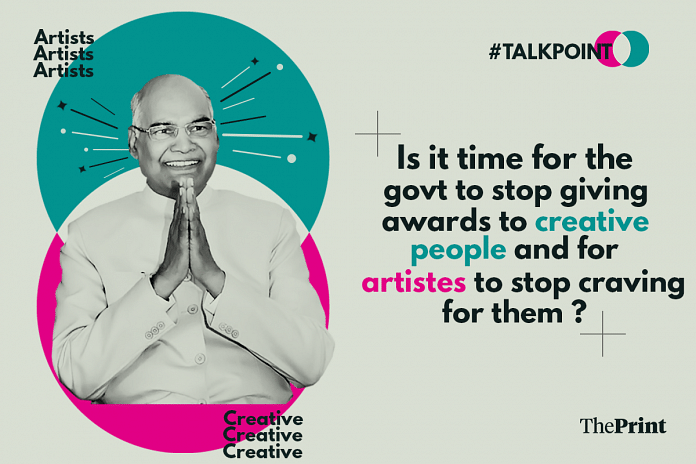Breaking a 65-year-old tradition, President Ram Nath Kovind handed out only 11 of 137 awards at the National Film Awards ceremony. As a result, over 70 winners withdrew from the event.
ThePrint asks: Is it time for the government to stop giving awards to creative people and for artistes to stop craving for them?
State-sponsored awards encourage technical excellence and are largely untainted
 Nishtha Jain
Nishtha Jain
Filmmaker, recipient of the Best Film (Social Issues), 2014 National Film Awards for Gulabi Gang
An independent committee of filmmakers is instituted by the Directorate of Film Festivals annually to preview the entries and confer awards on what they think are the best films. National Film Awards have been significant in recognising excellence in cinema. They, along with other state awards, are the few that recognise artistic achievement in film. Most of the existing independent awards give recognition exclusively to mainstream cinema. National awards are also important because they include a lot of technical awards like those for cinematographers, location sound, sound designers, etc. which otherwise are ignored. The national awards are still largely untainted.
We should not do away with state responsibility as far as the arts are concerned. It is our tax money that is utilised to confer these, and many such state awards. The present government is slowly abdicating its responsibility towards education, health, railways, heritage monuments. Should it also abdicate its responsibility towards the arts and the cinema? Tell me, what should the government do? Make more statues? More shrines? Spend on foreign sojourns of government officials?
Most countries in the world support their filmmakers and artistes either with grants or awards. In India, we had the National Film Development Corporation of India (NFDC) which supported many artistic films which otherwise would not have seen the light of the day. But today that institution is also dysfunctional. There are no support systems for filmmakers or artistes. National Film Awards and the Padma Awards are the last few remnants of a time when the Indian government supported and recognised excellence in the arts and cinema.
Government plays a critical role in promoting regional cinema
 Kaushik Sen
Kaushik Sen
Bengali actor
Personally, as an artiste and as a citizen of this country, I often disagree with the policies of the BJP. But this debate about the President not conferring all the awards is a little misplaced. All I have to say is, if the President had informed the ministry earlier, they should have told the recipients about it.
That said, this award has nothing to do with the President. My son was fortunate enough to receive it from him but even if he hadn’t, as his father and his guide, I would have asked him not to refuse to attend the ceremony. I have full moral support for those who left the ceremony but logically, I disagree with them.
This year, a vast number of regional films are being awarded from Lakshadweep, Odisha, Assam, etc. In a country where most award ceremonies indulge only in a vulgar celebration of the Hindi-belt movies, this kind of appreciation for artistic work done in regional languages is extremely important. Or else they’ll end up being ignored. In this aspect, the government has a critical role to play.
If you look at the vast categories of the awards or their recipients you will realise how important such events are. The jury members and the recipients of the awards are not influenced at all by the government. They have always worked independently and free of any pressure.
A National Award to makers of regional and non-feature films is a sign that the state cares
 Samarth Mahajan
Samarth Mahajan
Non-fiction filmmaker, awarded ‘Best On-Location Sound Recordist’ in the non-feature category for The Unreserved at the National Film Awards 2018
In our Bollywood-crazy nation, art house, regional and non-feature films continue to experience market failure, as there are few commercial incentives to produce them. The filmmakers behind such films spend years working on their projects, putting in personal money, sometimes even to screen their works, away from the fame and glory that box-office success brings.
A National Award to such artistes means that at least the state cares. It nurtures the idealist who wants to honestly express the world they live in, even if it is unflattering. More importantly, it highlights these works for a larger audience, exposing them to realities which can change their human experience.
Artistes have the ability to make people feel and help them understand the reality of the world around them. If we do not invest in humanising our society through art, it will continue to become increasingly soulless and divided along the lines of religion, caste, class and gender.
The state has to carry out its role of recognising and promoting the public good, while also treating these films as a celebration of our country’s unity in diversity. How else would important voices from every nook and corner of the country be heard?
Government patronage to artistes in today’s fragmented and polarised times is bound to raise questions
 Amrita Nayak Dutta
Amrita Nayak Dutta
Special Correspondent, ThePrint
The recent fiasco over the country’s ‘most prestigious’ film awards –the National Film Awards – with nearly 45 awardees boycotting the ceremony has raised questions about the validity of a government award for creativity.
The tradition of patronising artistes of performing and fine arts to encourage them with rewards/awards has been practiced by rulers of ancient, medieval and modern age. It was also common during British rule.
It can be argued that the state should continue the tradition. However, politically influenced patronage to favorable artistes in the context of film awards in today’s fragmented and polarised society makes it a redundant one.
The jury that decides the winners of the National Film Awards is handpicked by the government. A look at the regulations of the 65th National Film Awards reveals that the jury can only make recommendations, which will be then approved by the ministry of information and broadcasting. The ministry’s decision is final.
Some insiders say that the government’s interference in the selection of movies for the awards increased after Haider won multiple awards at the 62nd National Film Awards.
There have also been instances of conflicts of interest. Last year, under the chairpersonship of Priyadarshani, the jury selected Akshay Kumar as the best actor for Rustom. While it does not raise questions about the actor’s capabilities, it’s no secret that in many films Priyadarshini and Akshay Kumar worked on together.
Winners of the Dadasaheb Phalke Award also show that the award has traditionally been a Bollywood monopoly. Regional films have largely been ignored.
In such a situation, with artistes divided into separate watertight ideologies, it becomes easy to victimise an artiste, or for them to benefit from such an association. Often artistes miss an award depending on the dispensation of those power, despite their skills and dedication for arts.
Compiled by Deeksha Bhardwaj, journalist at ThePrint.
Illustration by Siddhant Gupta.




If the President of India is so high-brow that he can’t spend more than one hour in award giving ceremonies, two things he can do, he can choose from his pressing engagements which one he wants to attend and secondly he can withdraw himself from some of the ceremonies he is “due” to attend. The “awardees” feel they are being honoured bt the President, and the President feels honored to be amongst the “awardees”! Then the best thing would be to select outstanding “film” people be selected to give away the awards concerning the film’s. Educationists give away the awards to brilliant students or teachers. Let the President enjoy the company of Political heads of visiting dignitaries from from foreign countries.